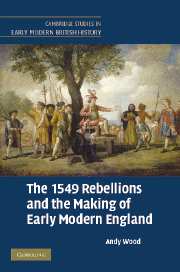Book contents
- Frontmatter
- Contents
- Acknowledgements
- List of abbreviations
- Preface
- Introduction
- Part I Context
- Part II Political language
- Part III Consequences
- 5 The decline of insurrection in later sixteenth- and early seventeenth-century England
- 6 Memory, myth and representation: the later meanings of the 1549 rebellions
- Bibliography
- Index
- Cambridge Studies in Early Modern British History
6 - Memory, myth and representation: the later meanings of the 1549 rebellions
Published online by Cambridge University Press: 14 July 2009
- Frontmatter
- Contents
- Acknowledgements
- List of abbreviations
- Preface
- Introduction
- Part I Context
- Part II Political language
- Part III Consequences
- 5 The decline of insurrection in later sixteenth- and early seventeenth-century England
- 6 Memory, myth and representation: the later meanings of the 1549 rebellions
- Bibliography
- Index
- Cambridge Studies in Early Modern British History
Summary
A creatively effective past, determining the present, produces in conjunction with the present a particular direction for the future, and, to a certain degree, predetermines the future.
(M. M. Bakhtin, Speech genres and other late essays (Austin, TX, 1986), 34.)‘WHEN WE WERE YONDER EATING OF MUTTON’ : IMMEDIATE RECOLLECTIONS OF THE 1549 REBELLIONS
Within a few weeks of the rebel defeat at Dussindale, the meaning of the commotion time had already become contested. Considered as a piece of rhetoric rather than simply as a legalistic formula, the indictment proffered against Robert Kett represented the first attempt to organise the story of the Norfolk insurrection into a chronological narrative. In order to initiate the trial of the Kett brothers, in November 1549 the Crown's lawyers drew up a brief outline of the case against the men. This indictment encapsulated the earliest ‘instant history’ of Kett's rebellion. Robert Kett was alleged to have assembled a rebel host on 20 July 1549 and to have maintained the camp for the ensuing six weeks. The indictment described rebel weaponry, making mention of the ‘banners unfurled, swords, shields, clubs, cannon, halberts, lances, bows, arrows, breast-plates, coats of mail, caps, helmets and other arms offensive and defensive, armed and arrayed in warlike manner’ and highlighted the use of ‘writings and bills’ written in the King's name ‘to excite and procure’ the Crown's subjects ‘to levy open war’. It claimed that the rallying cry of this rebel host had been ‘Kyll the Gentlemen’.
- Type
- Chapter
- Information
- The 1549 Rebellions and the Making of Early Modern England , pp. 208 - 264Publisher: Cambridge University PressPrint publication year: 2007



